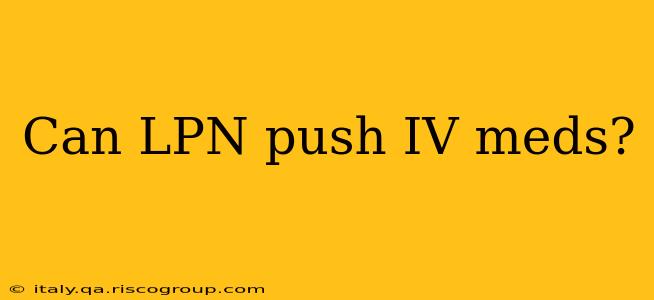The question of whether Licensed Practical Nurses (LPNs) can administer IV medications is a complex one, varying significantly depending on state regulations, employer policies, and the specific setting of care. There's no single, universal answer. While some states permit LPNs to administer IV medications under specific conditions, others strictly prohibit it. This guide will delve into the intricacies of this issue, providing a clearer understanding for both nurses and patients.
State-Specific Regulations: The Key Determinant
The most crucial factor determining whether an LPN can push IV meds is the state's Nurse Practice Act. These acts define the scope of practice for each nursing license level. Some states explicitly allow LPNs to administer IV medications, often with stipulations like:
- Specific training and competency: LPNs must complete an approved IV therapy course and demonstrate competency through practical examinations.
- Supervision: Administration might require direct or indirect supervision by a Registered Nurse (RN) or physician.
- Specific medications: The types of IV medications LPNs can administer may be limited to certain classes or those deemed low-risk.
- Setting of care: The permitted administration might be confined to specific healthcare settings, such as hospitals, clinics, or long-term care facilities.
Conversely, many states completely prohibit LPNs from administering IV medications, reserving this responsibility solely for RNs.
It's imperative to consult your state's Nurse Practice Act for the most accurate and up-to-date information. You can typically find these acts online through your state's board of nursing website.
Employer Policies: An Additional Layer of Regulation
Even in states where LPNs are legally permitted to administer IV medications, individual healthcare facilities may have their own internal policies that further restrict this practice. These policies may reflect the employer's risk assessment, staffing levels, and specific patient populations served. Therefore, understanding your employer's policies is critical.
Types of IV Administration: A Nuance to Consider
The term "pushing IV meds" often refers to administering a bolus injection directly into an IV line. However, there's a spectrum of IV medication administration techniques, and the legality for LPNs may differ depending on the method:
- IV push (bolus): Generally considered the most restrictive, with fewer states permitting LPNs to perform this.
- IV piggyback (IVPB): Adding a smaller bag of medication to the main IV line. This may be allowed in more states for LPNs.
- IV infusion: Administering medication over a longer period using an infusion pump. The regulations for LPNs performing this task vary considerably.
Patient Safety: The Paramount Concern
Regardless of legal permissibility, patient safety should always be the highest priority. Any IV medication administration must be performed by a qualified and competent healthcare professional adhering to strict sterile techniques and proper monitoring practices. Patients should never hesitate to ask a nurse about their qualifications and the procedures involved in administering their medication.
Conclusion: Verification is Essential
In conclusion, determining whether an LPN can administer IV medications requires careful consideration of state regulations, employer policies, and the specific type of IV administration involved. There's no blanket answer; individual verification is essential. Nurses should always refer to their state's Nurse Practice Act and their workplace policies, while patients should feel empowered to ask questions about their care providers' credentials and the procedures used. This proactive approach ensures the safest and most compliant care.

